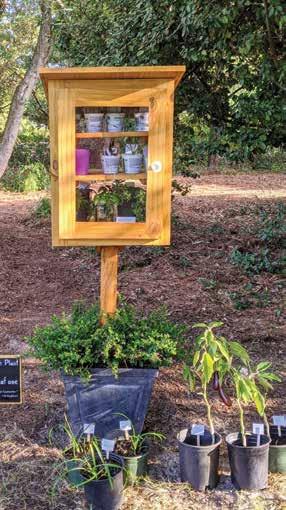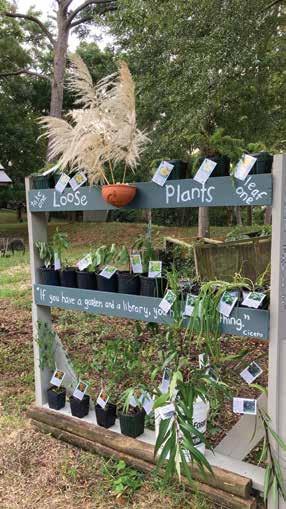
2 minute read
BUT FIRST
but fi rst...
Flower Power
Advertisement

Photos courtesy of Patricia Matthews and Jessica Loose.


How Does your Garden Grow?
AFTER SEEING SOMETHING SIMILAR IN ANOTHER STATE, Southern Shores resident Patricia Matthews came up with the idea of starting a Free Little Plant Library in her neighborhood last September (left). The idea was fairly simple: First, create a designated spot where likeminded gardening enthusiasts could rehome extra things such as seeds or other types of plants, and then foster that sense of community by asking people to use the honor system of “take one, leaf one.” Joined shortly thereafter by longtime Kill Devil Hills resident Jessica Loose, who hosts the Colington Harbour Free Little Plant Library (right), the fl edgling project already has an impressive 600-plus local members – and Patricia only hopes that their ranks will continue to increase. “I would love to see these Little Plant Libraries pop up all over the beach,” she says. “Word is getting out, and it’s been so nice to watch it grow.”
Back to Soil School
LOOKING FOR A REASON TO HIT THE BOOKS with the big kids at the end of summer – especially if you can do it outdoors? If so, you might fi nd your calling with the Dare County Extension Master Gardener Program. No special skills are needed beyond a commitment to learning more about all areas of horticulture – from botany to insects and landscape design – and later sharing that knowledge with the wider local community as a Master Gardener volunteer. The two-part training process (which consists of 40 training hours and a volunteer internship) is only held every two years, however, so if you miss the July 1 application deadline with the N.C. Cooperative Extension offi ce, you’ll have to start planning for 2023. For those ready to dig right in, though, classes start this September – and culminate with a graduation ceremony next year! If you plant it, they will come…especially when you’re talking about pollinators. An array of animals such as birds, beetles, butterfl ies and bees (plus plenty of other small mammals) are critical to sustaining our worldwide ecosystems, and a grassroots project called The Butterfl y Highway has been paving a new way forward in order to raise awareness about the importance of habitat restoration for pollinators in North Carolina since 2014. With the backing of the N.C. Wildlife Federation, this statewide program aims to establish a network of safe places for pollinators to thrive. The best part is that anyone can join in by registering their backyard gardens as Pollinator Pitstops along the loosely connected and ever-growing “route” – which has been steadily turning some small ideas into some big numbers. Since the project’s inception, more than 2,000 Pollinator Pitstops have been registered along The Butterfl y Highway, which has subsequently protected more than 30,000 acres of land for native pollinators in a wide variety of N.C. counties – including Dare, which hosts at least two Pitstops for the general public to visit at the Outer Banks Arboretum & Teaching Garden in Kill Devil Hills and The Elizabethan Gardens in Manteo.


NORTH CAROLINA IS HOME TO 500 NATIVE BEE SPECIES

